(Click the above 'LKFF News' and 'LKFF Interviews' links to access the other pages of this site subsection dedicated to the 2018 London Korean Film Festival)
LKFF2018 REVIEWS:
*All other reviews can be found in the main 'Reviews (Korean Films)' section of this website - see the link at the base of the Hangul Celluloid banner above*
LKFF2018 Review #10:
 |
"Dad, I've seen that girl. Every night she comes and finds me. I want to tell her that she can't come here but I can't speak...
She says we would have been classmates if she hadn't died because her seat was next to mine...
That girl really is dead, right?"
Synopsis:
Hyun-su (Ryu Seung-ryong) is a husband and father who desperately wants to give his family a better life. Having brought an apartment he can ill-afford, on the insistence of his wife, Hyun-su takes the decision to accept a job as a security guard looking after a dam in a remote village, his plan being to rent the new apartment out and move his family into accommodation provided as part of his employment, at least until his financial burdens ease.
However, again at the repeated behest of his wife, Hyun-su stupidly makes the long drive to check out the work-provided accommodation on a foggy night after a prolonged period drinking, and like a self-fulfilling prophecy his ‘accident waiting to happen’ decision becomes a tragic reality when he knocks down and kills a 12-year-old girl, Se-ryung (Lee Re), on an isolated, winding road. Absolutely panicked and unable to think clearly, Hyun-su dumps the child's body in a nearby lake and hurriedly leaves the scene.
A police investigation into Se-ryung's disappearance soon turns into a murder inquiry when officers find the child's battered body on dredging the lake and as her father, Young-je (Jang Dong-gun), vows to find her killer and exact his own revenge, Hyun-su is all too aware that if his guilt is uncovered the two will likely eventually come to life or death blows...
Review:
The early stages of Seven Years of Night are essentially split into three threads which gradually coalesce as the overall narrative unfolds and moves towards culmination. The two main threads of the three focus on Hyun-su and Young-je in the lead-up to Hyun-su’s car ploughing into 12-year-old Se-ryung and hurling her broken body a significant distance up the road, in the process perfectly detailing the part each man has ultimately played in her death - Hyun-su obviously guilty of driving inebriated and failing to pay due care and attention (though the full extent of his involvement is held back for a shocking revelation later in the film); while Young-je’s iron fist abuse of his daughter is entirely to blame for her attempt at escape, his deeply threatening pursuit of her being wholly responsible for her impulsion to run into the road in the first place. These lead-ins not only serve as explanatory background to the main narrative – in the process comparing and contrasting the two men's personalities – but also combine with repeated references to and depictions of familial abuse and brutality to speak of one of the film's main themes. That is, the ‘sins of the father’ being generational rather than isolated, if you will (at one point Hyun-su even states “I have become my father”).
Not only that, but director Choo Chang-min expands this further by showing how the fallout from one generation’s actions always impacts the next leaving the innocent and the young as the true victims; be it Hyun-su still dealing with his father's abuse decades later; the death of Se-ryung in the wake of her father's brutal beating of her; or indeed the vicious bullying Hyun-su’s son is subjected to at school as a result of Hyun-su’s (still to be revealed) crimes.
Numerous Korean films over the years have of course referenced similar ideas, often at length, but, regardless, Choo Chang-min’s statements on the issue stand as thought-provoking and well placed as an underbelly to the thriller he is about to unveil. All this within an effective tale of guilt, regret, blame and revenge that balances emotion and melodramatic pathos with deftly choreographed levels of violence and brutality severe enough to allow Seven Years of Night to easily stand alongside even the hardest-hitting of Korean vengeance oeuvres.
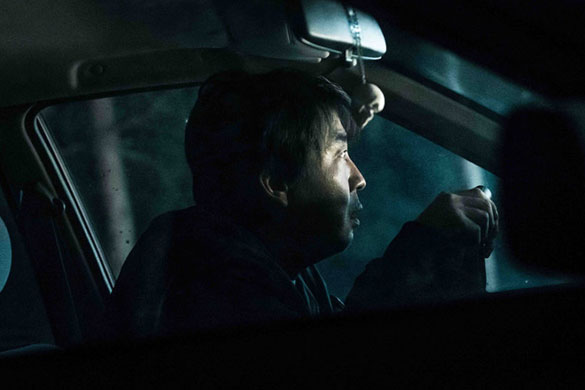 |
The third of the aforementioned beginning and ongoing threads is the implication that something supernatural may be taking place in the village and more specifically at the lake. At virtually the outset of the film it's made very clear that the locals are convinced the village lake is haunted and the evil it contains is responsible for anything untoward taking place in the area, fears which are further fuelled by the discovery of Se-ryung’s body in its depths. However, there are to my mind a couple of fairly major problems with this thread:
Firstly, Choo Chang-min repeatedly points to occurrences that could be supernatural or otherworldly (Hyun-su’s son, and later Hyun-su himself, apparently being visited by the ghost of Se-ryung; a shaman channelling the spirit of the young girl while grabbing hold of Hyun-su’s son at a ritual to save Se-ryung’s soul; etc.) but in each instance he ultimately sits on the fence, leaving situations as “are they or aren't they?” throughout. In other stories leaning more towards archetypal horror, if you will, that wouldn't necessarily be an issue but as Seven Years of Night increasingly shows itself to be closer to standard revenge fare in every other respect, leaving these (perhaps) supernatural happenings hanging in mid-air without even a nudge towards a final yes or no (and, ultimately, virtually ejecting them altogether) frankly feels like a repeated, closely missed opportunity to actually raise the film to the merged genre heights Choo Chang-min clearly wanted it to reach.
That said, such extensions would have been in danger of changing the focus of the narrative overall and since it does ultimately work on a mano-a-mano revenge level I can at least partly understand why Choo held back as much as he did, but that fact in itself has negative connotations in relation to the effectiveness of this thread's entire inclusion.
So, why include it at all? Well, that very question brings me to the second problem with this ‘is it or isn't it’ supernatural thread:
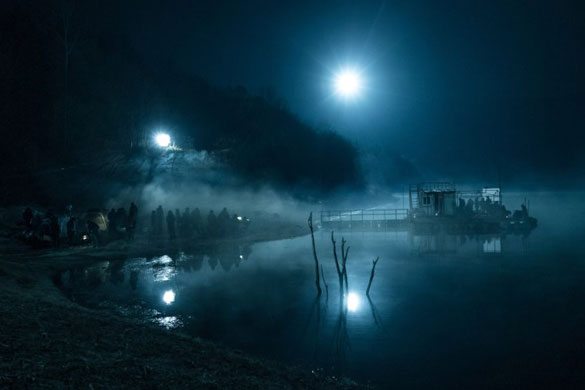 |
From the dark and fairly twisted depiction of the shaman ritual to the appearance of a sole female on the edge of proceedings warning of impending doom, Choo Chang-min appears to be trying to channel Na Hong-jin’s The Wailing on numerous occasions, while disembodied voices calling to characters (albeit from a well rather than a cave) positively scream of Huh Jung’s The Mimic - their appearance together making the supernatural elements of Seven Years of Night feel like a hybrid of the two. As far as I'm concerned, you can take that as an answer to the earlier question of why Choo Chang-min chose to play the (possible) supernatural card in the first place but frankly these various elements’ cinematic origins are to my mind so blatant (in spite of the narrative being based on Jeong Yu-jeong’s 2011 novel A Night of Seven Years) that Choo Chang-min more often than not could be accused of aping rather than originating.
It's not that they aren't depicted decently enough, it's just that frankly they've all been done before and in a more unnerving manner to boot.
Seven Years of Night moves along at a fairly brisk pace (the death of Se-ryung comes at the 30 minute mark, but still wholly feels like it's far earlier in proceedings) though repeated flashback sequences do at times tend to slow things to a degree. That's really only a niggle at the end of the day but what is more deserving of criticism is the fact that Seven Years of Night is too long (even at 2hrs 3m duration). Simply put, on two specific occasions the narrative feels like it has reached its natural conclusion, only to then carry on. These story extensions/completions are worthwhile in their own right but their placement following big, seemingly final moments leaves them ultimately feeling far more like post main story codas.
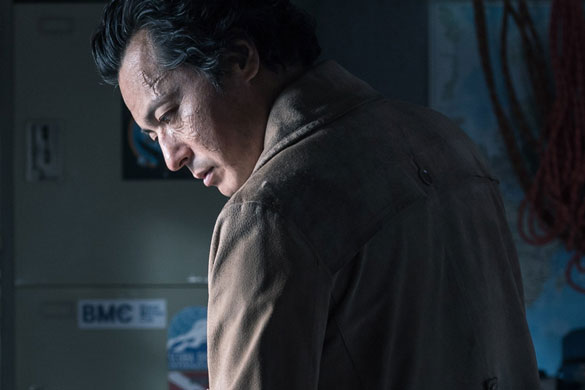 |
Summary:
As a hard-hitting, brutal revenge thriller balanced with emotion and pathos detailing guilt and regret, Seven Years of Night stands up well to scrutiny. However director Choo Chang-min’s decision to repeatedly leave supposedly supernatural elements open to question brings with it a feeling of missed opportunities.
Seven Years of Night (7년의밤) / 2018
Directed by Choo Chang-min
Starring RyuSeung-ryong, Jang Dong-gun, Go Kyung-pyo and Moon Jeung-hee
|
All images © CJ Entertainment
Review © Paul Quinn
|
| |
|
LKFF2018 Review #9:
 |
"I'm not as good as you think. The dream? That's a good thing, but a dream is just a dream, more often than not.
With life being so tough, dreams are only for children. In reality, dreams can't always make us feel happy..."
Synopsis:
29-year-old Seong-hye's (Song Ji-in) life is a daily struggle to make ends meet. Since quitting her position as an intern at a large company a number of years ago as a result of a shocking incident, she has had little option but to take on numerous menial part-time jobs from morning to night not just to keep the wolf from her own door but to pay her father's monthly hospital bills in the wake of his stroke too, all the while studying at a job centre to try to improve her chances of job interview success.
Regularly stressed to the point of panic attack and always overworked, Seong-hye has not only developed insomnia but is also beginning to suffer from a noticeable and increasing deterioration in her physical health. With even her hand-to-mouth existence as such hanging in the balance, Seong-hye learns of the death (an apparent suicide) of one of her close friends who had asked to borrow money just weeks before, forcing her to face the possibility that if she'd lent the money asked for her friend might just still be alive...
Review:
Right out of the gate I am aware how deeply and darkly angst-ridden the above synopsis makes The Land of Seong-hye sound but while that certainly has become true by around three-quarters of the way through the running time, the annoyances, struggles and bleak occurrences Seong-hye faces are incremental over time, appearing as weight upon weight placed on her shoulders rather than a full-on bludgeoning of her spirit, even though that is ultimately the case. The time taken in ever so gradually stripping Seong-hye of her desperately clung to hope also guarantees viewers will truly feel for her as her situation worsens and want a change for the better for her as much as she yearns for one herself. The showing of the (seeming) increasing hopelessness of Seong-hye’s life is also entirely necessary to give realistic motive to her character arc as a whole and to both underline the film's major theme with copious societal critique and social commentary and indeed allow the narrative to become believably and beautifully uplifting in its conclusion. Considering what you've just read, it may come as rather a surprise to hear me describe The Land of Seong-hye as ultimately uplifting and indeed life-affirming, but the fact that it is (and successfully so) in the wake of such focused-on adversity is a testament to the film's overall strength.
The Land of Seong-hye opens with a park scene set in the dead of winter, thick snow in patches covering the icy ground. Seong-hye sits on a bench apparently watching life unfold around her as various members of the public make use of municipal exercise machines. However, in hindsight or on second watch the truth of the matter becomes blatantly clear. For once we become aware that our heroine’s work/life balance is almost entirely work, we realise that rather than watching life in motion Seong-hye is in fact watching life pass her by, her seat on the bench at the very edge of proceedings underlining how separated she is from it, a viewer of life rather than a participant – this idea being further referenced as the narrative progresses with Seong-hye seated outside her work, shops or on the street. Not only that, but director Jung Hyung-suk’s decisions to set the film in the months of winter and film solely in black and white combine with the story itself to further accent the fact that Seong-hye’s existence has no colour; rather being grey within a world wholly cold.
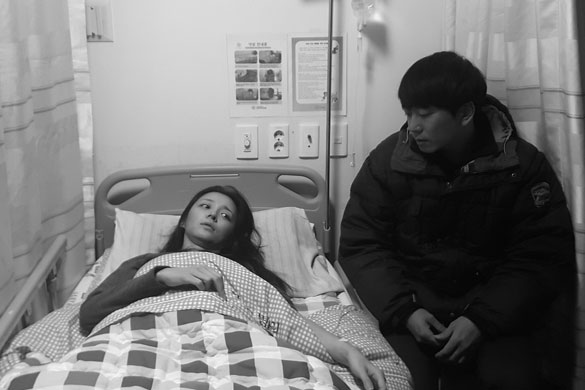 |
Considering the nature of the story and the fact that this is a Korean film, you could be forgiven for assuming that melodrama at some stage will play a significant part. However, while melodramatic moments do occur they are largely muted (another of the film's many strengths). On hearing bad news or having to mentally process something else that's gone wrong in her life, Seong-hye is repeatedly shown sitting silently, staring at nothing in particular with only a long, exasperated sigh pointing to the feelings she keeps so well hidden (an utterly exemplary and nuanced performance by Song Ji-in as the titular character adding greatly to this and the film's strength throughout), and as such when she is eventually pushed to let her control slip it is absolutely earned to the nth degree - yelling that she's “pi*sed off" when a bunch of kids leave an absolute mess of food and drink in the store where's she's working; when the moped she uses to deliver newspapers breaks down, leaving her having to push it up inclining streets; or when some terrible news finally causes her to fall apart emotionally - while never appearing as heavy handed or melodrama for melodrama’s sake in any respect.
Some might say that the numerous and increasing instances of tragedy befalling Seong-hye are perhaps somewhat contrived to specifically cause her as much pain as possible. However, to mind, in reality such instances are rarely isolated (how many times have you heard it said that bad luck comes in threes?) and frankly, let's face it, when you're down you're all the more likely to be kicked. Ask Seong-hye and I bet she'd agree.
Social commentary abounds in The Land of Seong-hye – from the below minimum living requirement wages paid to those in menial labour forcing many to take on numerous jobs at the expense of their health and wellbeing; to difficulties associated with the Civil Service exam to be even able to apply for a decent job; to the hoops that must be jumped through in multi-stage interviews; to sexual misconduct in the workplace; to the issue of ever-increasing rents; and even poverty and desperation driven suicides in Korea; and beyond – with each and every societal reference speaking of the film's ultimate theme that in an increasingly money driven Korea work at the expense of life may be necessary but it is ultimately no life at all.
It is wholly significant that the first time we see Seong-hye smiling is at the 1h 35m mark (within a two-hour film) but to say any more would, I fear, detract from The Land of Seong-hye’s sheer power as societal critique.
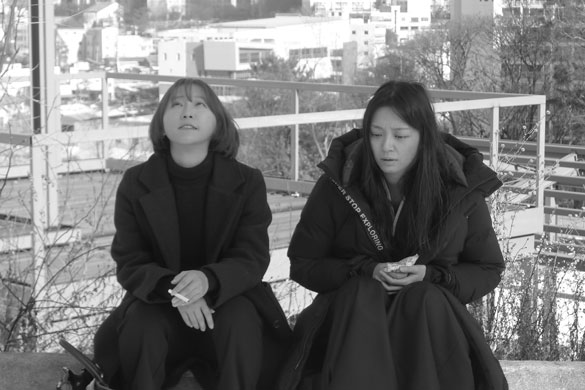 |
In spite of screening at the 2018 Jeonju International Film Festival and (later) at the London Korean Film Festival 2018 – winning the Korean Competition Grand Prize at the former – The Land of Seong-hye has been shown domestically only once in one Korean cinema on just a single screen, a period so brief that if you'd blinked you'd have missed it. Most people did indeed miss it (and frankly missed out, in the process) with admission numbers barely registering on official box office data. There also appears to be no current plans to screen the film on a broader scale.
Considering the increasing number of huge studio backed blockbusters being screened on almost endless screens in Korea for protracted periods of time, garnering record-breaking profits regardless of them often being glaring examples of style over substance, The Land of Seong-hye’s shoddy treatment, to my mind, screams of the dangers posed to the very existence of independent Korean films by the increasing stranglehold conglomerates and the largest commercial studios have on the Korean film industry at large.
In short, The Land of Seong-hye is wholly deserving of far more recognition and accolades than its miniscule, single screening box office takings might imply – its lack of audience pull coming wholly as a result of the near impossibility of securing a broad screening base without the backing of the ‘big boys', if you will, rather than being any sort of a negative reflection on what is ultimately a powerful, nuanced, intimate and contemplative social drama.
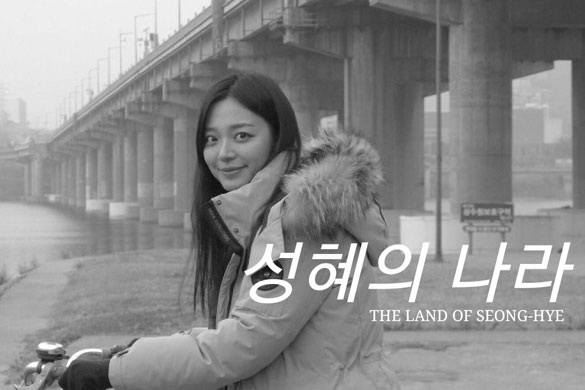 |
Summary:
Poignantly angst-ridden yet ultimately uplifting and life-affirming, The Land of Seong-hye is not only an intimate, contemplative tale of one young woman's struggles and life journey but also a powerful societal critique of her land, Korea.
The Land of Seong-hye (성혜의나라) / 2018
Director: Jung Hyung-suk
Cast: Song Ji-in, Kang Doo
|
All images © Post Fin, Korean Film Council (KOFIC)
Review © Paul Quinn
|
| |
|
LKFF2018 Review #8:
 |
"I was angry and curious about mom leaving so suddenly. I wanted to live well and prove I didn't need her...
Only, I came back without finding any answers. I wonder if mom found hers?..."
Synopsis:
Having been away studying in Seoul, Hae-won (Kim Tae-ri) returns to her family home deep in the Korean countryside when she fails to pass the teachers’ exam. Figuring that just a few days alone spent away from the stresses of urban living will allow her to turn her thoughts and confusion on her future into some semblance of order, she tells no-one she's at her mother's house but in spite of her efforts to stay anonymous and undisturbed, it isn't long before her aunt, her two closest childhood friends, and indeed various nosey, middle-aged women from around the village discover she's there, begin making assumptions about her life, and start asking far too many questions that she frankly doesn't want to, and won't, answer. However, the one set of feelings Hae-won can't hide is her anger at the fact that her mother (Moon So-ri) has taken off to who knows where to “do all the things I gave up to get married and raise you".
As days turn into weeks and months in this idyllic rural setting, the issue Hae-won has with her mother’s seemingly uncaring actions increasingly pervades her thoughts, threatening to steamroller over the myriad of other things she's trying to come to terms with in her life...
Review:
How would you describe Korean cinema? While I'm fully aware that answering such a frankly preposterous question would be virtually impossible in anything much less than an almost thesis-length response, your perception of Korean film as a whole will likely have been coloured by the examples you first came into contact with and how your genre viewing preferences have diversified since. Certainly for a time at least, Western viewers (to a huge degree in the UK and to a lesser extent the US) whose beginning forays into Korean cinema came in the early to mid 'noughties' are as likely as not to have first found some of the (later considered classic) K-films released as part of Tartan's Asia Extreme DVD label. Consisting of movies from various East Asian regions with a commonality of extreme content – be it brutally violent thrillers, blood-soaked gorefests, or graphically extreme horrors and the like – the Asia Extreme series certainly did Korean cinema a huge favour in bringing seminal films to international audiences. However, it was so well and prominently marketed that it somewhat overshadowed releases of Korean films from other less confrontational genres (which were admittedly far fewer and far between on the international DVD market) and even for a time led some to believe that Korean films were inherently violent. That is of course a hugely blinkered view (extreme content is certainly a not-insignificant part of Korean cinema but it really is just a chapter in the Korean cinema history portfolio), but while the legacy of Oldboy and the like has been tempered over the years by a greater general audience awareness of a far more diverse range of Korean film genres, it has lingered in the fact that thrillers, action blockbusters and horrors are far more likely to be made available internationally (and more prominently so) than romances, heartfelt dramas and comedies - distributors knowing they're more likely to be an easy sell, at the end of the day.
However, there is a Korean cinema trope that is to my mind every bit as important to Korean cinema as a whole as any hard-boiled, blood-soaked content; that is films consisting of profoundly gentle, contemplative stories that are – to paraphrase Tartan – quiet ‘in the extreme’. From the sublime Take Care of My Cat (2001); through 2004's This Charming Girl; to My Mother the Mermaid (also 2004); My Dear Enemy (2008); and beyond, these largely relationship focused films centred on the tiniest of day-to-day moments may have almost whispered narratives but they nonetheless positively scream of life-changing character journeys as monumental as any hard-hitting, extreme tale. With Little Forest, director Yim Soon-rye takes what was originally a Japanese manga and subsequently a two-part live action Japanese film and transplants it to Korea knowing full well that the themes presented will speak directly to Korean audiences and Korean film fans alike, even feeling legitimately Korean in nature, in the process. The fact that Little Forest was given a cinema release in a number of US cities in March 2018 really speaks of the increasing awareness and indeed popularity of small, nuanced Korean films internationally... and that's a big step forward in my book.
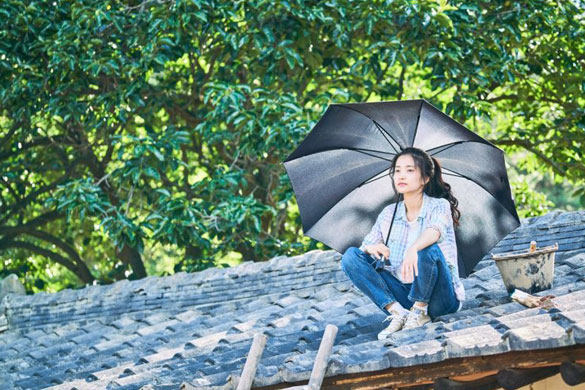 |
Little Forest opens with a short scene showing Hae-won cycling through the sumptuously beautiful, sun-soaked Korean countryside; her brief narration pointing out that she has been back home for three months, living in an area that takes an hour's bike ride simply to get to the nearest village store. Small snippets of narration (always by Hae-won) continue throughout Little Forest, and while in most circumstances I'm not a fan of narration – more often than not I see it as frankly lazy exposition or little more than unnecessary audio filler to detail what viewers can already see is going on on-screen in films that won't allow even a moment's contemplative silence – here it works really well, feeling that we're almost in direct conversation with Hae-won - being confided in on her loves, loathes and annoyances; being given a background to her reasons for and the methods by which she creates her numerous gastronomic delights (more on that in a moment); and even being given an extra insight into the myriad of thoughts and feelings going on in her head, even those she chooses not to share with her two closest friends.
*Disclaimer*
My description of the “extra insight” into Hae-won’s thoughts and feelings was entirely deliberate in spite of me being fully aware that an actress as phenomenally talented as Kim Tae-ri doesn't actually need any extra help whatsoever. Kim Tae-ri is an incredibly expressive actress and viewers will routinely have a fair idea of what her character is thinking and feeling just by taking a look at her changing expressions (to the nth degree, in fact). The accompanying narration simply focuses that viewer awareness and points it directly - be it at her mother, her friends or indeed her culinary endeavours, and as such it simply stands as gently underlining her already obvious talent. While we're on the subject, each and every one of the performances in Little Forest are exemplary. You'll truly believe Hae-won and her two closest friends, Jae-ha and Eun-sook (played by Ryu Jun-yeol and Jin Ki-joo), have known each other for their whole lives. Their chemistry is palpable; their interactions (and indeed gently humorous arguments) are wholly natural and believable; and indeed when you watch them hang out together and have food at the conclusion of their day, I virtually guarantee you'll want to hang out with these genuinely sweet characters too, as long as they allow you to share the frankly incredible, wholly natural gastronomic treasures that fill their table.
And speaking of food:
Visually sumptuous scenes of the preparation of absolutely mouth watering culinary masterpieces are numerous throughout Little Forest. While these sit alongside the utter beauty of Hae-won’s surroundings perfectly and stand as a physical representation of the fruits, if you will, of Hae-won and her friends’ daily toils, the scenes’ full raison d'être only becomes clear as we are introduced to Hae-won’s mother in flashback (Hae-won's face-to-face interactions with her mother are shown only in flashback and always, always predominantly feature food and culinary discussions). The two are equally fastidious in their culinary undertakings; they both have similar beliefs about the spiritual importance of self-prepared food and cooking; and in fact the more we see of her mother, the more we realise Hae-won is wholly a product of her upbringing, and almost a physical manifestation of it at that. Not only that, but in spite of Hae-won’s annoyance at her mother's seemingly uncaring actions in leaving and her belief that they are wholly different as individuals, viewers will soon come to realise that these two are cut from entirely the same cloth and have far more similarities that Hae-won would be comfortable with admitting. The question becomes whether Hae-won will ultimately come to that realisation and if she will allow herself to accept it if she does?
 |
The film's narrative is spilt into the seasons of the years; each altering the farming and cultivation-based lives of the main characters to a huge degree. While Hae-won’s life in Seoul is shown ever so briefly, the contrasts between her urban existence and her idyllic rural life are blatantly on show, nonetheless. Those of you/us who live and work in highly populated urban cityscapes will be wholly aware that the seasons really make little difference in the grander scheme of things. We may be aware of the heat and the cold and indeed the move between seasons but how they affect our day-to-day travails is minimal. We have little choice but to deal with life, whatever it may actually be, on very much a daily, weekly and monthly basis: We get up each day, make the trek to our employment and back, and try to find some sort of work/life balance along the way through our wholly (as far as I'm concerned) unnatural existences. This idea is even referenced in the careers of Hae-won's two friends, Eun-sook and Jae-ha; with Jae-ha drunkenly rambling about how cool his life as a farmer is while Eun-sook repeatedly moans about her job at a bank, even at one point hitting her boss over the head with a tamborine during an enforced late night karaoke session.
Little Forest resolutely shows that in leaving Seoul and returning home, Hae-won's life and her work become balanced naturally by nature itself, and far more happily and life-affirmingly than any nine-to-five (or six) city job under florescent lights would or could ever allow.
Little Forest is visually stunning, thematically rich, highly engaging and wholly cathartic in nature, and its focus on the tiniest, seemingly insignificant moments that make up the majority of a life absolutely redefines the idea of what's truly important. Not only that, but, on a personal level as someone who, like Hae-won, grew up deep in the countryside and left for a city life on the first available opportunity, Little Forest spoke to me on a deeply profound level, underlining thoughts and feelings that have increasingly been coming to the fore as age takes its toll.
At one point before eating a meal with her friend Eun-sook, Hae-won states that she came home because she was hungry, and though she means it literally, Little Forest ultimately states without a shadow of a doubt that its meaning is also wholly metaphorical.
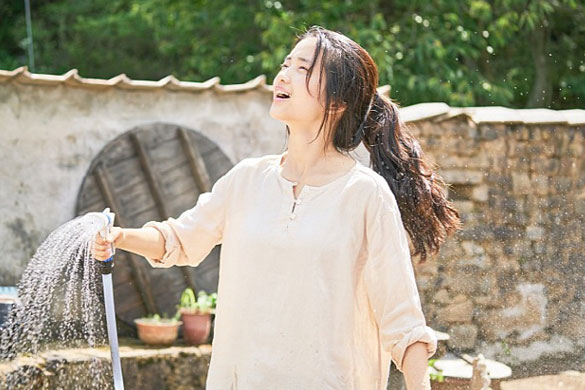 |
Summary:
Ultimately, not just a visual gourmet feast for the eyes but sumptuous cinematic food for the modern-day soul too, with Little Forest director Yim Soon-rye takes what was originally a Japanese manga and transplants it to Korea knowing full well that the themes presented will speak directly to Korean audiences and Korean film fans alike, even feeling legitimately Korean in nature, in the process.
LITTLE FOREST (리틀포레스트 / 2018)
Director: Yim Soon-rye
Starring: Kim Tae-ri and Moon So-ri
|
All images © Megabox PlusM, Watermelon Pictures
Review © Paul Quinn
|
| |
LKFF2018 Review #7:
 |
"You think I've done something?
A*shole! You're treating me like this because you love that bitch! B*stard!!!..."
Synopsis:
Im Tae-san (Choi Min-sik), president of the Taesan Group conglomerate, is in a committed relationship with popular singer Yoo-na (Lee Ha-nui; aka Honey Lee), much to the consternation of his daughter Mi-ra (Lee Soo-kyung). On attending a student reunion at a popular nightclub in Gangnam, a severely drunken Mi-ra is shown a video of Yoo-na having sexual intercourse with another man and instantly going postal she messages her father's lover demanding that they meet immediately.
The next morning, Mi-ra regains consciousness in her car – the vehicle clearly having been involved in a serious accident – to find herself surrounded by police and, though she claims to have no memory whatsoever of the preceding night, she is straight away arrested for Yoo-na’s brutal murder.
Tae-san, however – in spite of initial evidence showing Mi-ra in a less than positive light – refuses to believe his daughter could be guilty of such a heinous crime and vows to use his money and influence to both clear her name and bring the real perpetrator to justice...
Review:
Heart Blackened begins with the first meeting of Mi-ra and Yoo-na at an upmarket restaurant, overseen by Tae-san. Initially polite if somewhat tense, the interaction of the two seems to be going fairly well – Yoo-na even holding Mi-ra's hand, prior to Tae-san joining them – until Yoo-na removes a book belonging to Mi-ra from her handbag; featuring pictures of Mi-ra, her mother and Tae-san from her childhood days. Instantly, Mi-ra goes on both the defensive and offensive, and in one fell swoop her animosity for the woman she will never allow to take the place of her mother begins to burn, never to be quelled.
Jumping to one year later in proceedings (in fact to the very night of Yoo-na’s murder), director Jung Ji-woo deftly and succinctly references the ongoing and increasing animosity Mi-ra feels towards Yoo-na simply by mention of the difficulty of the situation in a conversation between Yoo-na and Tae-san aboard his yacht. While many another would have felt the need to include scenes at this stage of arguments and altercations of the two women at odds, by instead using only obvious implication and simple statement (for example, shortly after being arrested, Mi-ra screams at her father “You're treating me like this because you love that bitch!”) Jung Ji-woo negates the need for such protracted inclusions; ensuring the soon to be deeply involved narrative is never slowed unnecessarily nor drawn away from events directly relating to the murder itself and the subsequent investigation into it.
In the lead up to, and indeed during, Mi-ra’s murder trial, several of Tae-san’s actions raise questions about his motivation: Here we have a rich, powerful man vocal in his determination to clear his daughter's name, so why does he agree to employ a young, inexperienced lawyer (Choi Hee-jeong, played by Park Shin-hye) to defend Mi-ra; when Tae-san discovers an ‘assassination game’ on Mi-ra's laptop –a computer game made by her in which an avatar of Yoo-na is strangled and stabbed by an avatar of Mi-ra, is dragged onto a balcony and thrown to the ground below while the Mi-ra avatar laughs – why does he instantly instruct his subordinates to post the ‘game’ on Facebook and make it widely available online; and when the trial is at a pivotal point, why does Tae-san suddenly insist on taking time away to travel to Thailand on ‘business’? Passing spoken ‘reasons’ for each of these seeming incongruities is given at the time of their inclusion in the narrative but though they may at least be partly true as viewers will later discover they are as much excuses as anything else; the truth state of play behind each being far more deftly layered and beautifully involved than is initially apparent. In any such drama – courtroom or otherwise – where viewers piece together a complete story over time in tandem with the characters, there could of course be accusations of lying by omission, but in the case of Heart Blackened, to my mind at least, the (deliberate) feeling of disparity between action and motivation these moments bring essentially drives viewers to see them as clues to figuring out an outcome ultimately far more unpredictable than many would imagine.
A major ‘reveal’ prior to the film’s ultimate conclusion claims to fully explain these various incongruities. However, the fact that it seemingly tells the whole story while half an hour of the running time remains screams yet further of well-crafted layer within narrative layer, virtually guaranteeing viewer surprise at one major point or another regardless of all or any audience predictions, accurate or not though those predictions may be.
There are also repeated references throughout Heart Blackened by Tae-san relating to his wealth and power and even the inequality between the haves and have-nots in Korean society, with the clear implication that he feels those inequalities are not only inescapable but also the way things should be. While these are largely just statements by one self-important individual with no particular attached commentary or dissection, it's clear that director Jung Ji-woo is showing how easily money can make certain types of individuals truly believe they are better than those without, and that is indeed an ongoing issue within Korean society as a whole.
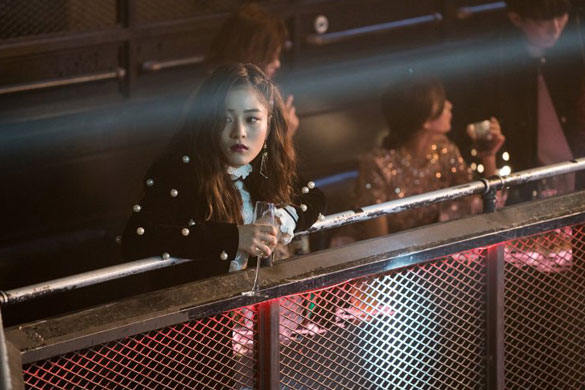 |
Though Heart Blackened is loosely based on the 2013 Chinese film Silent Witness, the pacing of Jung Ji-woo’s Korean version is far more measured than the noticeably over-pushed, even jarring, speed of director Fei Xing’s original. I say ‘loosely based on’ because though Jung Ji-woo sticks largely to the same story ideas and plot twists of Silent Witness for a fair portion of Heart Blackened, he manages to bring enough originality to the narrative to ensure the film never feels like just a rehash. In fact, considering the themes present of love, hate, sacrifice and death, Heart Blackened could almost be considered as a modern day re-telling of a Pansori-type tale, and as such the film ultimately feels utterly Korean through and through.
The decision to split the narrative into trial segments, ongoing ‘real time’ plot developments and flashbacks gradually unveiling the chain of events surrounding and subsequent to Yoo-na’s murder also works incredibly well; the somewhat slower (obviously), largely sedentary courtroom sections regularly peppered with moments of both action and intrigue, in the process ensuring that the narrative never feels like it's dragging in any respect and allowing it to tantalisingly unveil its secrets at a wholly natural pace without a fear of stagnation in any respect.
Visually, Heart Blackened is absolutely stunning. Early scenes such as those showing Yoo-na in a singing performance and in a romantic yacht outing with Tae-san are utterly sumptuous, easily equal to the visual beauty seen in huge budget Korean Japanese-set pieces or historical tales that have taken the Korean box office by storm in the last few years, the former even evoking thoughts of such. Similarly, scenes set in upmarket Gangnam – including a high-end, pulsing nightclub – shimmer with all the glitz, glamour and opulence that one would expect, and even the more gritty segments of the film have a cinematic sheen, if you will. Heart Blackened’s story certainly doesn’t require it to be seen on the big screen, but its gorgeous cinematography nonetheless invites exactly that.
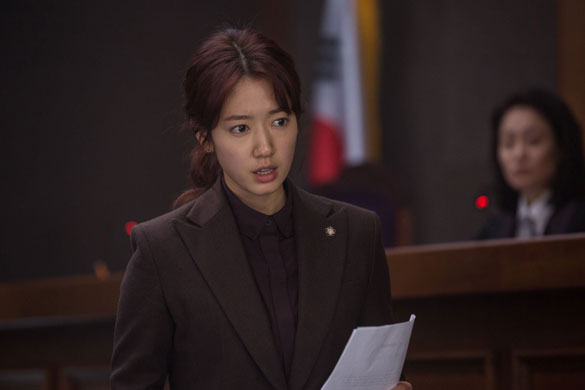 |
The acting in Heart Blackened is accomplished throughout, with Park Shin-hye (Hee-jeong), Lee Ha-nui (Yoo-na) and Lee Soo-kyung (Mi-ra) in particular standing out as well cast in their roles. However, make no mistake, this is Choi Min-sik’s film from start to finish; his absolutely exemplary performance as Tae-san raising the film to noticeably greater heights on numerous occasions. As one of Korea’s best actors for the guts of the past 30 years, Choi can always be relied upon to raise the performance bar of virtually any film but in Heart Blackened he surpasses even himself, if such a thing is possible. Here we see a combination of hard-hitting, cold and heartless elements as seen in his recent big budget roles as gangsters and corrupt businessmen with far more, hugely nuanced emotionality that could be said to come straight from his far softer, more in-depth character portrayals in classic films such as Happy End (also directed by Jung Ji-woo), Failan and even the altogether lighter Springtime. The list of films with pitch-perfect acting from Choi Min-sik of course continues to grow year in, year out, but his performance in Heart Blackened easily stands alongside the best of the best, and that really is saying something.
Ultimately, Happy End and Eungyo have already highlighted Jung Ji-woo’s talents as an exemplary and important film-maker and director. Heart Blackened underlines those talents yet further.
Summary:
Heart Blackened is a visually sumptuous, multi-layered and beautifully involved tale of love, hate, sacrifice and murder. While based on the 2013 Chinese film Silent Witness, director Jung Ji-woo brings enough originality to proceedings to ensure the film never feels like simply a rehash. In fact, considering the themes present, Heart Blackened could almost be considered as a modern day re-telling of a Pansori-type tale, and as such it ultimately feels utterly Korean through and through.
You can read the 2012 London Korean Film Festival Interview with director Jung Ji-woo (featuring Hangul Celluloid) at:
http://www.hangulcelluloid.com/jungjiwoointerview.html
HEART BLACKENED (침묵) / 2017
Director: Jung Ji-woo
Starring: Choi Min-sik, Park Shin-hye, Lee Soo-kyung and Lee Ha-nui
|
All images © CJ Entertainment, Yong Film
Review © Paul Quinn
|
| |
LKFF2018 Review #6:
 |
"Hey! Sort this out before you go!"
Sang-hoon (Yang Ik-june) is not a man who could be described as cultured. With an ingrained penchant for violence he has found almost a calling in his job working as a hired thug for a debt collection company, required to inflict pain on those who owe money to his boss but cannot pay. Even when he is not working, he regularly lashes out with both his fists and his tongue, giving physical and verbal abuse - often at the same time - to those who have the audacity (from his point of view) to say or do anything with which he doesn't agree. In fact, virtually the only time Sang-hoon doesn't swear or punch anyone is when he's too busy spitting in the street, and even that leads to an altercation with schoolgirl Yeon-hee (Kim Kkobbi, aka Kim Kkot-bi), when he inadvertently spits on her as he is passing by. Being a girl who stands up for herself, Yeon-hee calls him on the act and ends up knocked out on the ground for her trouble. However, her feisty nature refuses to let Sang-hoon get away with what he's done and, once she recovers, demands recompense, his pager number (he doesn't even have a mobile phone) and a promise that he will make amends. He grudgingly agrees (being somewhat impressed by the nerve of the girl) and slowly they begin to warm to each other...
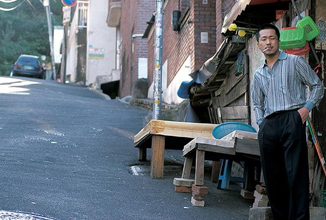 |
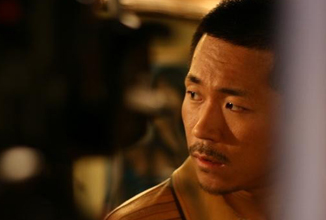 |
Sang-hoon and Yeon-hee are both from troubled backgrounds, with violence infecting and affecting their daily lives and, as such, their friendship can be seen as a bonding of kindred spirits:
As a child, Sang-hoon witnessed the death of his mother and sister (caused by his father) and over the ensuing years the resultant emotional and psychological scars have blocked almost everything but hate from his heart. His father, having returned home after serving 15 years in prison, is a constant reminder of everything Sang-hoon despises and even though those around him attempt to convince him to give his father (now a shattered, broken man) some attention and care, Sang-hoon cannot forgive him and instead chooses to focus his attention on inflicting pain on the man and watching him suffer. In fact, Sang-hoon’s only positive relationship (until he meets Yeon-hee) is with his step-sister’s son, who is himself an introverted and troubled child, and even though Sang-hoon’s step-sister attempts to make numerous in-roads to bring Sang-hoon closer, he consistently goes out of his way to keep her at arms’ length.
Similarly Yeon-hee has been without her mother since her death, when Yeon-hee was still just a child. Her father is a crippled Vietnam veteran, with an (unnamed) disease, who has subconsciously convinced his unstable mind that his wife isn't dead and that she has, instead, run off with another man. Even Yeon-hee's brother Yeong-jae (Lee Hwan), a unemployed high school drop-out, is a damaged individual who is progressively becoming more violent as each day passes - primarily focusing his bullying on Yeon-hee and demanding money from her, on almost a daily basis. Though she detests her situation, Yeon-hee has had little option, since her mother's death, but to become the mother figure of her household and take care of the family who treat her as nothing more than a slave, but her growing friendship with Sang-hoon begins to spark a glimmer of hope that there may be a better future awaiting her, and the time that she and Sang-hoon spend together quickly becomes a means for both of them to gain temporary respite from the violence surrounding them, while waiting for that better life - which they both ache for - to unfold.
Sadly, neither Sang-hoon nor Yeon-hee are aware that their pasts are already linked by violent events and that those events are set to echo into both their futures to cataclysmic effect.
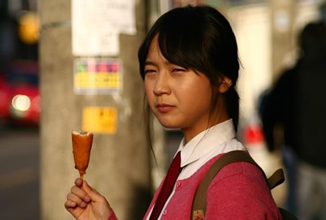 |
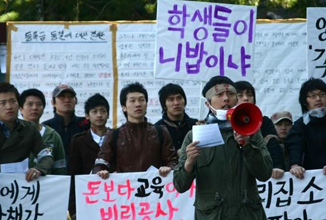 |
Themes involving familial dysfunction and/or violence are often depicted in South Korean cinema but seldom are they shown to go hand in hand to the extent seen in Breathless, and even films which do address the
combination of these issues tend to discuss them only with regard to how they affect the present, rarely showing the ever-increasing vicious circles - often spanning generations - which can result. In a historically patriarchal society, such as Korea, the fact that the depiction of the violence surrounding all of the characters in Breathless is as a result of masculine actions (from the past through to the present and, inevitably, set to continue into the future), combined with a resultant lack of feminine familial influences, is both a bold and controversial statement which holds true in any society but Breathless (thankfully) avoids any of the contrived upbeat resolutions or saccharin-coated happy endings which tend to plague the mainstream films of many other countries.
Breathless doesn't preach its themes or give overt answers to the subjects discussed but those answers are clearly on view within the sub-text of the film and the causes are, plainly, impossible to deny. Violence breeds violence which, once started, can snowball, engulfing and destroying the lives of all those who come into contact with it.
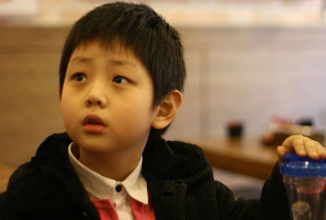 |
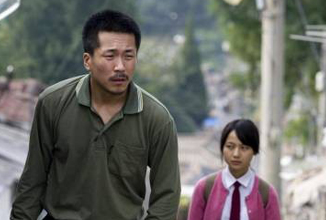 |
Direction, Cast & Crew:
Yang Ik-june's work in Breathless (as writer, director, lead actor and producer) is breath-taking. Though he is not an experienced director he has learnt his craft expertly from his years working on films in various roles and in various positions. His direction is low-key enough to allow his astounding performance to take centre stage but still involved enough to drive the plot, beginning from an almost first-person perspective and slowly moving to the third-person as Yeon-hee's story begins to play a bigger part within the story. It is obvious that Breathless is a project which is extremely important to him, and very close to his heart, and that shows from the opening scene to the last.
The film is unashamedly low budget but that actually works in its favour, giving proceedings a downbeat feeling (perfectly suited for characters whose lives are themselves downbeat) but, that said, the constraints of the budget never cause any visual or aural issues – in fact the only scenes which look noticeably low budget are the scenes of Yeon-hee and Sang-hoon enjoying themselves (often also featuring Sang-hoon's nephew) and one can't help but feel that they are deliberately so - their importance standing out more as a result. These scenes are also largely bereft of any sound, save a single guitar, and it could be said that this is a personification of Sang-hoon himself: When he is with the people he has grown to care for he is, at least partly, at peace (and his inner voice silenced) and the swearing, shouting and spitting that occurs at other times only comes as a result of having something negative or violent to react against. Violence is loud and abrasive, love is harmonious and quiet, if you like.
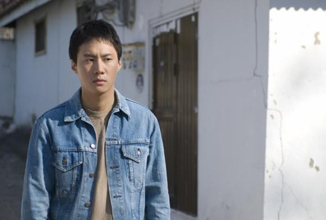 |
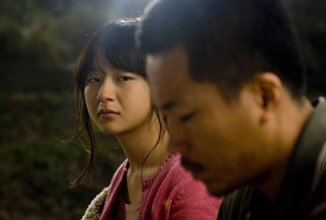 |
The roles of Sang-hoon (Jang Ik-june), Yeon-hee (Kim Kkobbi), Yeon-hee's brother Yeong-jae (Lee Hwan) and Sang-hoon's nephew are by far the largest and most important within Breathless. Each of their performances is exemplary and it would be next to impossible to single one out as being better than the rest. Each of the main portrayals perfectly captures the relevant character (which are all universally well drawn) and brings out a realism and believability that gives complete justice to this remarkable film. With regard to the two main characters:
Kim Kkobbi's impassioned portrayal of Yeon-hee effortlessly conveys her character's strength and vulnerability with an understated style and, from the very moment that she awakens from having been knocked out by Sang-hoon, her polished performance ensures that viewers are firmly on her side throughout the course of the film.
Jang Ik-june’s success at making the audience care about Sang-hoon is also quite an achievement, considering his temper and violent outbursts, and the characterization produced perfectly compliments that provided by Kim Kkobbi.
The lesser character portrayals, though many are small or passing, are also easily worthy of praise.
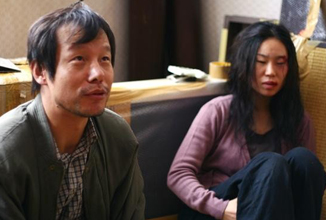 |
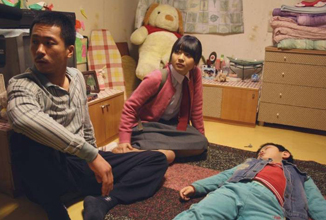 |
Summary:
Breathless is a visceral discussion of the legacy which violence can create and the ease with which it can span generations, infecting everything and everyone in its path. An outstanding film which truly packs a punch, Breathless will take your breath away.
Actors: Jang Ik-june, Kim Kkobbi, Lee Hwan, Jeong Man-shik
Director: Jang Ik-june
Breathless will be released on DVD in the on March 22nd by TerraCotta Distribution.
The TerraCotta UK DVD release of Breathless is presented as a 2-disc Collectors Edition, utterly packed with extras, in deluxe packaging and containing a multi-lingual booklet (in both Korean and English).
The quality of this release is exemplary and reminiscent of the stunning first-pressing Region 3 releases that are so famous for their quality.
I, for one, wish that all Region 2 DVD releases could be as good as this - a must-have on all levels.
DVD Extra Details:
Packed with special features including the directors own video cam footage from the Rotterdam International Film Festival, and a Q&A at London Korean Film Festival with Yang Ik-june, and specially written sleeve-notes from the director and actress Kim Kkobbi, this truly is a collectable.
The screening DVD used for this review was provided courtesy of TerraCotta Distribution (www.terracottadistribution.com)
and The Associates (www.the-associates.co.uk)
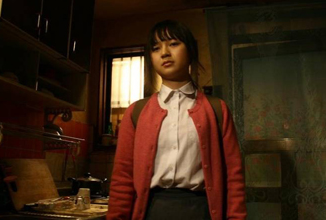 |
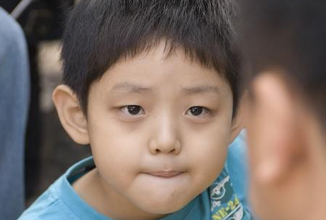 |
|
All images © TerraCotta Distribution
Review © Paul Quinn
|
| |
LKFF2018 Review #5:
 |
"Do you know how much I laugh inside when you say only I can understand you?
Don't think I was ever your friend... You disgust me."
Synopsis:
Following the suicide of high school student Gi-tae (Lee Je-hoon), his father (Jo Seong-ha) attempts to find his son’s closest friends, Hee-joon (Park Jeong-min) and Dong-yoon (Seo Jun-yeong), in an effort to discover why Gi-tae chose to take his own life.
However, almost immediately he finds himself facing a wall of virtual silence, with Hee-joon only reiterating the fact that he moved schools weeks before Gi-tae’s death and claiming that Dong-yoon dropped out of school and virtually disappeared.
While Gi-tae’s father tries to get Hee-joon to open up to him, the boys’ stories are gradually told in flashback, and as cracks begin to show in their relationships, we watch as their friendships slowly fall apart, camaraderie being increasingly replaced by animosity…
Review:
Friendships are rarely as straightforward as a cursory glance would suggest, especially in our formative years. Even barely scratch the surface, and black and white can almost be guaranteed to crumble to reveal a myriad of grey. Add testosterone-fueled masculine aggressiveness, hiding deep inner feelings and growing psychological scars, to the mix and you'll have difficulty preventing the resultant powder keg from being ignited, and thus the only uncertainty becomes the question of whether that psychological time bomb will ultimately explode, implode, or both.
The first scene we witness in Bleak Night is a flashback to two (at this stage, unnamed) boys of high school age viciously fighting (or, more accurately, one boy being beaten up by the other and his companions), and such is the ferocity and downright venom of the altercation that the last thing one would assume is that these boys are friends - the scene immediately referencing the idea that any friendship or relationship is far more complicated and multi-layered than can be gleaned from first impressions.
Directly following this scene, the film jumps to the present day and we are introduced to Gi-tae's father, and as he tries to find the truth behind his son's death, the stories of the boys’ friendships gradually unfold in parallel.
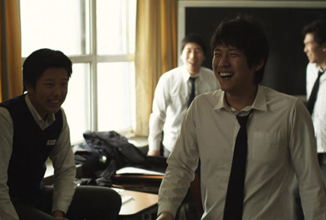 |
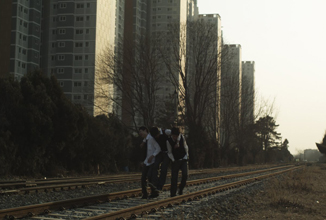 |
Though stories detailing themes of changing, and disintegrating, friendships; the pitfalls of adolescence; peer pressure and bullying; as well as broken families, are fairly common in South Korean cinema, Bleak Night delves a great deal more deeply than most, and while the fact that the narrative unfolds almost incrementally for a large portion of the film may mean that some find the pacing (certainly in the first half of the film) slower than they would ideally like, to my mind the time taken is not only warranted but is, in fact, necessary in order to allow for the palpable and ever-building feeling of tension to positively scream that the aforementioned powder keg could, and likely will, explode at any moment. And when it does, as we knew it would sooner or later, Bleak Night majorly shifts up several gears to become a gripping insight into the spiraling consequences of actions and the resultant reactions to them.
However, Bleak Night goes yet further, discussing culpability, guilt and the perception of blamelessness. While both Hee-joon and Dong-yoon claim to be innocent of any involvement in the events which led to Gi-tae’s demise, it becomes increasingly clear that regardless of whether or not they honestly believe their protestations (or if they are, in fact, lying to themselves as much as to others), not a single one of the boys (Gi-tae included) could be said to be truly blameless, and the fact that no action or reaction is ever an isolated, finite event, is repeatedly shown.
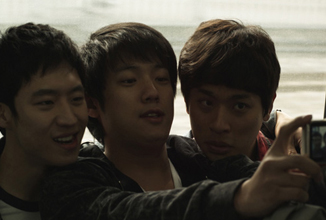 |
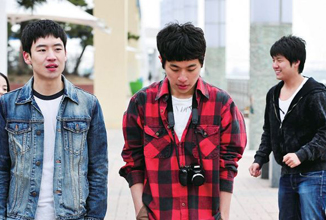 |
As a final note on the themes present within Bleak Night, it pretty much goes without saying that with the narrative focused around a group of male characters, the vast majority of the themes centre on masculinity and male characteristics. However, there is one small scene (at around two thirds of the way through the film) which not only shows how utterly different female perceptions of, and reactions to, events within relationships are to those of males, but also allows each to be compared and contrasted beautifully:
With the growing
problems within his friendship with Gi-tae filling his thoughts, Dong-yoon is noticeably monosyllabic on a night out with his girlfriend, Se-jung, but while he follows the typically male characteristic of keeping his worries and feelings to himself, remaining outwardly strong and not sharing (or even mentioning) them, she (assuming that his quietness is because he is becoming bored with her) instantly brings the subject up in conversation and asks him to give her his watch, which holds great sentimental value for him. When he asks her why, she, without a second thought, says "Because, if I take your watch, I know that I'll see you again." Open, honest, empathetic and eager to talk through problems before they escalate, Se-jung personifies every character trait that the boys try to hide, dismiss or deny.
 |
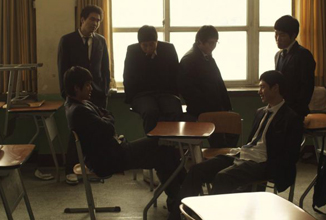 |
Cinematically, Bleak Night is an indie film, through and through. The film was, in fact, director Yoon Sung-hyun's graduation project at the Korean Academy of Film Arts, but it never appears so and, ultimately, any director would likely be proud to have produced such an accomplished, nuanced and multi-layered work. Visuals throughout contain muted (some might say bleak) colours, mirroring the grim reality facing the main characters and though the judicious use of hand held camera work could be said to be somewhat predictable, it nonetheless serves to accentuate the realistic tone present and even, to a degree, the growing instability of the friendships and indeed the boys themselves.
Summary:
A multi-layered, multi-themed dissection of adolescence, Bleak Night delves into issues of peer pressure, bullying, guilt, blame and culpability within a brooding, yet gripping, tale of the intricacies and difficulties of relationships.
Cast:
The performances of the entire cast of Bleak Night are top notch throughout, especially considering the young ages of the majority of the main actors. While, initially, Lee Je-hoon’s portrayal of Gi-tae is the most overt and noticeable (largely due to his character’s increasing arrogant aggressiveness) the acting of both Park Jeong-min (as Hee-joon) and Seo Jun-yeong (as Dong-yoon), is equally nuanced. Each adds a great deal to the realism of the narrative and the believability of their characters' actions and reactions, or deliberate lack thereof.
Main actors:
Lee Je-hoon, Park Jeong-min, Seo Jun-yeong, Jo Seong-ha
DVD
The DVD edition reviewed here is the Korean (Region 3) Single Disc Edition from Filament Pictures. The film is presented as an anamorphic transfer with an aspect ratio of 1.85:1 and there are no image artifacts (and no ghosting) present.
The original Korean language soundtrack is provided as a choice of Dolby Digital 5.1 and Dolby Digital 2.0 and is crystal clear and well balanced throughout.
The English subtitles provided for the main feature are of high quality with only a couple of minor grammatical/spelling errors present.
English-speaking viewers should note that, as with many Korean DVD releases, there are no subtitles available on any of the extras.
DVD Details:
• Director: Yoon Sung-hyun
• Format: NTSC, Anamorphic, Widescreen, Subtitled
• Language: Korean
• Subtitles: English, Korean, None
• Sound: Dolby Digital 5.1, Dolby Digital 2.0
• Region: Region 3
• Aspect Ratio: 1.85:1
• Number of discs: 1
• Classification: 15
• Distribution: Filament Pictures
• Run Time: 117 minutes (approx.)
DVD Extras:
• Director's Commentary
• Short Film 'Children' (32 minutes)
• Theatrical Trailer
|
All images © CJ Entertainment, KOFIC, Kafa Films, Filament Pictures
Review © Paul Quinn
|
| |
LKFF2018 Review #4:
 |
"If you see me in church, don't talk to me... pretend you don't know me."
Synopsis:
Seung-cheol (played by director Park Jung-bum) is a North Korean defector struggling to survive in his new surroundings in the South by taking any and every job he can find, no matter how badly paid or demeaning it may be. His only friend (with whom he shares a tiny, dilapidated apartment) is Kyeong-cheol (Jin Yong-wook) who treats him as little more than a bumbling, inadequate fool and thinks nothing of stealing from shops and charging other North Koreans to send money back home to their relatives, and, in fact, even the policeman (Detective Park, played by Park Young-duk) who is helping them to settle in their new country constantly berates Seung-cheol on an almost daily basis.
While working for a pittance putting up posters for a sex shop throughout the city, Seung-cheol's attention (and heart) is caught by Sook-yeong (Kang Eun-jin), and following her he manages to secure a job in the karaoke bar where she works.
However, no sooner does he begin to dare to hope that he may have finally found someone with whom he can really connect and may be at last be heading towards a life worth living, than he discovers that even appearances can be deceptive...
Review:
Life presents us with challenges. That's what it does, and it is rather good at it. And while some ultimately see the struggle against adversity opening up veiled opportunities leading to an eventual happy ever after, others just never seem to get an even break.
One such individual is Seung-cheol who, having struggled his whole life in North Korea, risked life and limb to extricate himself from his altogether desperate situation and escape to a (hopefully) better life in the South, but far from becoming an integral part of some kind of utopian society, he has, instead, been increasingly marginalised and left with no alternative but to eke out whatever semblance of an existence he can, simply to survive from day to day.
When we are first introduced to Seung-cheol, he already appears to have been beaten by life. His apologetic demeanour - head often bowed and eyes focused downward - positively screams of his desperation to be accepted and allowed to find and live a normal, quiet existence, but try as he might to both do the right thing and fix situations that have already gone wrong, every single step he takes seems to achieve nothing but to bring another blow to knock him down yet further.
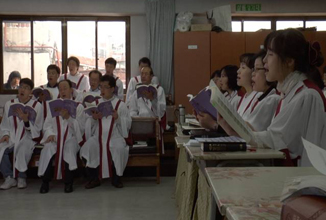 |
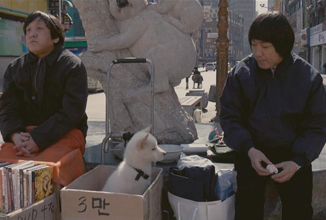 |
While those he comes into contact with, as well as those he works for (and even the individuals who conflict with him), certainly couldn't be said to care, the fact of the matter is that they're just too busy keeping their own heads (just) above water to have time to concern themselves with the needs of this obvious outsider. Yes, Seung-cheol is consistently exploited and, yes, he does repeatedly fall prey to the fallout from, and consequences of, others' personal agendas, but they too are living hand to mouth and that in itself can't fail to affect the rules of engagement.
From a cursory glance, it could be said that Seung-cheol is rather naive and while, considering his background, that's entirely understandable, even here there is a further level to be considered: For, Seung-cheol's biggest problem isn't his lack of awareness but rather his desire to connect and truly become a part of a South Korean society from which he is largely separate and shut off, invariably resulting in him taking people far too readily at face value and thereby making himself an all too easy target, without him even consciously realising it.
Add to that the fact that almost everyone's outward persona differs from who, and what, they really are - deliberately so, in an attempt to allow them to, or for them to be deemed to, fit in - and Seung-cheol can consequently be almost guaranteed to get the reality of situations wrong, at virtually every conceivable opportunity.
They say nice guys finish last but, in Seung-cheol's case, the question quickly becomes whether he will ever finish at all or even come close to the eventual happy ending he so desperately desires and so truly deserves.
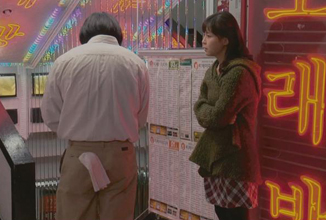 |
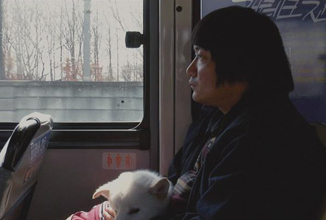 |
With The Journals of Musan, director Park Jung-bum provides a in-depth character study of his real-life friend Jeon Seung-cheol while detailing the difficulties faced on a daily basis by those (outsiders and South Koreans alike) who find themselves on the very outskirts of society.
The characterisations present are incredibly realistically drawn and portrayed throughout, ensuring that viewer empathy is kept at its utmost from even the early stages of the film with the nature of that empathy gradually morphing from sympathy for Seung-cheol to respect. This subtle change in audience reaction was likely deliberately sought by director Park, especially considering his friendship with Seung-cheol, but never feels forced or in any way fake and, in fact, serves to raise the level of poignancy almost exponentially on numerous occasions.
Considering its storyline, The Journals of Musan was always going to be an incredibly dark affair, but it never fails to touch the heart and firmly stays in the mind long after the credits roll.
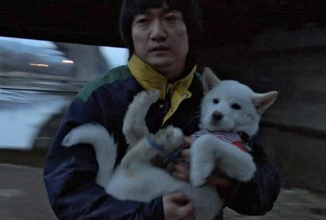 |
Park Jung-bum was assistant director on Lee Chang-dong's Poetry (2010) and the effect of working with the master of subtlety (and of arresting gripping drama from the tiniest of moments) clearly shows throughout The Journals of Musan. While Park Jung-bum is not yet in the same league as Lee Chang-dong (and let's face it, who is?), he is, nonetheless, a talent worth looking out for in the future.
Jeon Seung-cheol sadly died of stomach cancer aged just 30 years old, and The Journals of Musan resolutely stands as a fitting and lasting tribute to a good and gentle man who was never really given a proper chance.
Summary:
The Journals of Musan is without question an incredibly dark affair, but it never fails to touch the heart and ultimately stands as a fitting tribute to a gentle man who was never given the chance he truly deserved.
DVD:
The DVD
edition reviewed here is the Korean (Region 3) Single Disc Release
from Art Service Korea, provided as an anamorphic transfer with an aspect ratio of 1.85:1. There are no image artifacts and no ghosting present, and the
picture remains consistently sharp throughout.
The original Korean
language soundtrack is provided as Dolby Digital 5.1 or Dolby 2.0, and is bright and clear throughout.
Excellent subtitles are provided for the main feature, but English speaking viewers should be aware that there are no English subtitles available for any of the DVD extras.
DVD Details:
Actors: Park Jung-bum, Jin Yong-wook, Kang Eun-jin, Park Young-Duk, Kwon Kwi-deok
Directors: Park Jung-bum
Format: NTSC, Widescreen
Language: Korean
Subtitles: English, Korean, None
Region: Region 3
Number of discs: 1
Distributor: Art Service Korea
DVD Extras:
Commentary with director Park Jung-bum and Myong-ji University professor Kim Young-jin
Short film: "125 Jeon Seung-cheol" (2008) |
All images © Art Service Korea
Review © Paul Quinn
|
| |
LKFF2018 Review #3:
 |
"Excuse me. I'm selling grasshoppers... I'll give you a discount."
Synopsis:
Jin (Kim Hee-yeon) is a girl of elementary school age who, along with her younger sister, Bin (Kim Song-hee), lives with her mother (Lee Soo-ah) in a small apartment within a faceless tenement building in the city. Even though she is just six or seven years old, Jin still has a fair amount of responsibility placed on her shoulders - being required to, daily, pick her sister up from the baby sitter, set the dinner table and help her mother around the apartment, while still being expected to keep her grades up at school - all of which she does without complaint, and with only a minor amount of bed wetting. Her mother, however, is rather world-weary and is clearly having difficulty dealing with all that life has thrown at her. When she and her daughters are evicted from their home, she decides to go in search of Jin and Bin's estranged father - in a last-ditch attempt to get her life back into some sort of order - and takes the girls to stay with their "Big Aunt" (Kim Mi-hyang) while she is gone. Before she leaves, she gives Jin and Bin a large piggy bank and tells them that each time they are well behaved and do what their aunt tells them to, they'll be given a coin to put inside the "piggy", and she promises that, when it is full, she'll return. So, the girls begin their quest to get as many coins as possible, as quickly as possible, in order to ensure that their mother comes back sooner, rather than later...
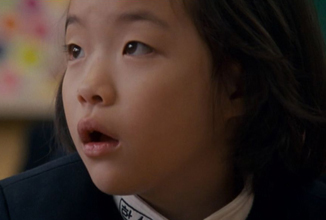 |
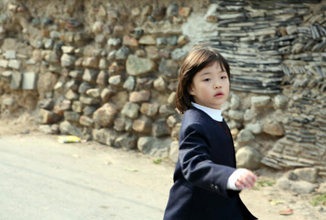 |
Treeless Mountain shows us an intricate picture of a world seen from three feet off the ground. Adults are regularly shown as faceless torsos, speaking from high above our field of vision and, as a result, we experience (and become immersed in) events exactly as Jin and Bin see them. With little life experience, the two girls take people and situations at face value, and though their hopes and needs may initially seem small, their importance to the girls quickly makes them equally important to us. As Jin (especially) begins to learn that things aren't always as they appear (or aren't always they way that she's told they are), our awareness that she is, likely, going to be disappointed adds an extra level of poignancy to proceedings. Case in point: The instant the girls have filled "piggy" to the brim with money, they excitedly race to the bus station and wait for their mum to get off the bus - as she promised she would. We already know what the outcome is likely to be, and as the reality of the situation slowly dawns on the girls (in this and subsequent sections), we can almost physically feel their innocent outlook on life being stripped away, resulting in the scenes becoming very moving, and almost painful, to watch. Everything is subtly shown in Treeless Mountain, with nothing being spelt out or preached, and our understanding of each situation comes much more from Bin and Jin's facial reactions and body language than from the words being spoken, thereby drawing us further towards seeing the world as Jin and her sister believe it to be.
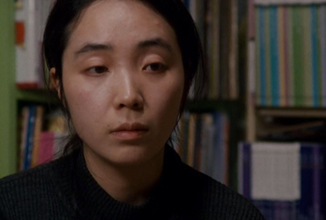 |
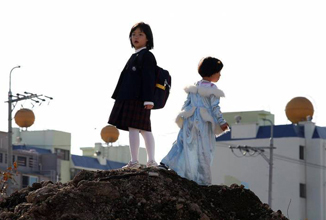 |
Right from the way that Jin and Bin dress (Jin in a functional tracksuit, Bin in a "fairytale princess" dress), through to their actions and reactions, it is clear from early on that the personalities of the two sisters couldn't be more different: Though Jin is physically (and mentally) older than Bin, she is much more introverted, less open and trusting, and it is obvious that the responsibilities with which she has been burdened at such a young age have weighed heavily on her. Bin, by contrast, is much more optimistic - always ready to play, to explore, to try new things and talk to new people - and though she looks up to, and is largely looked after by, her sister, in the end her outlook on life plays as large a part as Jin's down-to-earth, business-like attitude does, in pulling both characters through the situations with which they are presented, and in their ultimate discovery of where happiness and contentment truly come from.
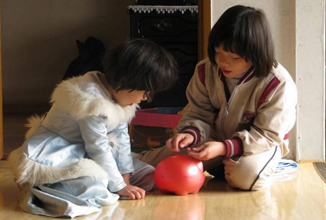 |
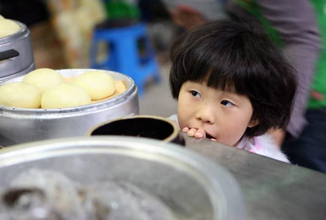 |
Cinematically, Treeless Mountain positively screams documentary. Intimate and up close camera work, often focusing solely on Jin's face, combined with a totally music-free soundtrack give a noticeable feeling that we could easily be watching real life unfold. Every scene is expertly crafted to be quietly gripping and even the tiniest of events contained within each take on a vital importance as a result. Though the film has an underlying gentleness and innocence derived from our empathy with the characters, there is also a deliberate harshness evident in many of the characterisations of the adults portrayed and, as such, Treeless Mountain is often not an easy film to watch. However, there is a quiet beauty present in every scene and the underlying uplifting, and life-affirming, message makes watching Treeless Mountain an enriching experience.
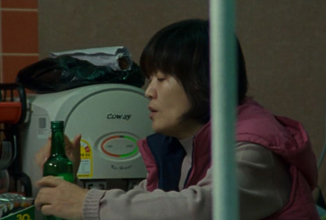 |
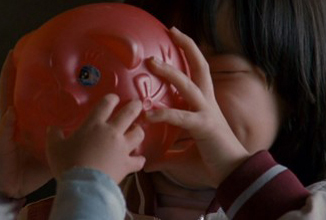 |
Cast:
Aside from Lee Soo-ah and Kim Mi-hyang (as Jin's mother and aunt, respectively) none of the cast are professional actors. To fill the roles of Jin and Bin, director Kim So-yong interviewed a large number of children in various Korean elementary schools - and what an amazing find Kim Hee-yeon and Kim Song-hee are:
Kim Hee-yeon, as Jin, gives easily one of the most natural and believable portrayals I have ever seen in any film. It never once appears that she is acting - seeming, much more, to actually be living the life of her character - and her innate ability to show her cognitive processes perfectly with little more than a tiny glance, or incredibly subtle facial movement, is frankly astounding. In short, her performance single-handedly raises the level of every aspect of Treeless Mountain.
Kim Song-hee, as the much younger Bin, obviously has a less involved role, but her genuine sense of fun, and the obvious warmth of the feelings between her and Kim Hee-yeon, shine through each time she appears on screen.
Considering how young both girls are (and their lack of acting experience), Kim So-yong has accomplished an astounding feat in guiding the children to give such beautiful, believable and utterly engaging performances and note should be made, at this point, of the deleted scenes which form part of the extras - where her unique, and light-hearted, game-playing approach to directing the two girls can be seen.
The remainder of the cast all give great performances but, as this really is Jin and Bin's story, they are much smaller, and more supporting, roles.
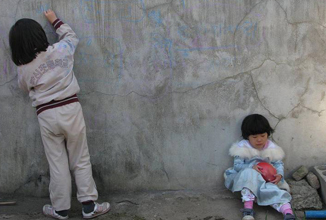 |
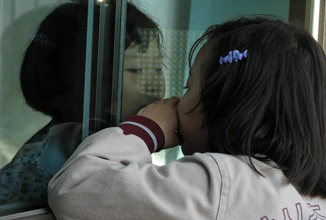 |
Summary:
A quietly gripping, sometimes painfully heart-breaking, and ultimately life affirming drama, Treeless Mountain provides an unmissable view of the world of the main characters, from three feet off the ground.
DVD
The DVD
edition reviewed here is the Korean version (Region 3) release
which consists of a single disc DVD with an aspect ratio of 1.85:1. There are no image artifacts and no ghosting present, and the
picture remains consistently sharp with colours which compliment the documentary feel of the film. The original Korean
language soundtrack is provided as a choice of Dolby Digital 5.1 and Dolby Digital 2.0 and each is clear and expansive, giving full justice to the soundtrack, and the lack of incidental music allows for much subtler sounds of the world surrounding the girls to be gently accentuated.
Excellent removeable subtitles are provided
throughout the main feature, with the extra feature subtitling being burnt in as part of the image.
DVD Extras:
Deleted scenes
Outtakes
Interview (with Kim Hee-yeon and Kim Song-hee)
Post Screening Discussion (with Kim So-yong) - conducted in English
Trailer
Photo Gallery
DVD
Details:
Treeless Mountain (DVD) (Korea Version)
Director: Kim So-yong
Language: Korean
Subtitles: English, Korean
Country of Origin: South Korea
Picture Format: NTSC
Disc Format(s): DVD (Single Disc)
Region Code: Region 3
|
All images © Soandbrad Films, Parts and Labour Productions, Strange Loop and CJ Entertainment
Review © Paul Quinn
|
| |
LKFF2018 Review #2:
 |
"If you really didn't have anything to say, couldn't you at least have made up an excuse not to come?"
Jeong-hae (Kim Ji-soo) is a twenty-something post office worker who leads a quiet, somewhat isolated, existence. With a rather sparse social life, mainly consisting of lunch (and a few after-work drinks, every now and then) with her co-workers, she spends most of her free time alone in her apartment tending to her plants, eating take-away kimchi and falling asleep on her sofa-bed, in front of the TV.
However, her (largely self-imposed) separation from the outside world is no longer serving the purpose which it once did, and changes brewing inside her slowly begin to drive a need for something to fill the emptiness which she increasingly feels, and a desire for some kind of connection. In an attempt to serve those needs, she adopts a sickly kitten - determined to care for it and nurse it back to health - and when a would-be writer, (Hwang Jung-min), begins to frequent the post office where she works, she believes that she may have finally found the connection she has been searching for. However, as she tentatively begins to open herself up to him, and the outside world, past traumas are resurrected which threaten to lead her down a very different path...
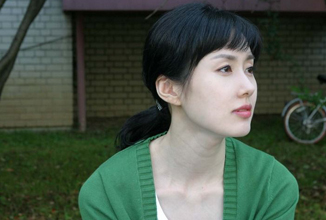 |
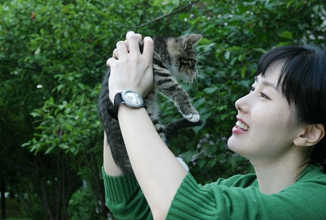 |
Jeong-hae's day-to-day life is outwardly unremarkable and, as such, she is not the type of character who would usually be the focus of a story, but every intimate moment we spend in her company reveals that there are numerous hidden layers to this lady who has shut herself off from the outside world out of necessity. She is the person whom everyone knows but no-one has really taken the time to get to know - the girl who is "quiet, but seems really nice" - and, as a result, her story becomes an insight into a world which only she has seen.
From the earliest stages of the film, repeated references to stray eyelashes on her cheek really sum up Jeong-hae, her state of mind and others' perceptions of her - utterly ordinary at a cursory glance, but with something out of place on closer inspection. Except, the people around her choose not to delve to discover what is displaced, leaving Jeong-hae yet further detached from them and even more alone.
As her story unfolds, the tiniest, seemingly inconsequential, events in her life are shown to be of vital importance to the person she is (and is becoming) and, though she tries to face the changes she is going through head-on, part of her still subconsciously fights to remain the way she is - a perfect example of which is her adoption of the kitten, at the same time serving as something she can connect with; as a talking point to facilitate connection with others and also as a readymade excuse for her to leave their company and return to her solitude ("I'll have to leave early... I'm worried about my cat at home all alone").
The more we learn of the depth of her pain, the more blatantly clear it becomes that without the human connection which she so desperately needs (whether she fully realises it or not), she is quickly heading towards either giving up completely or exploding.
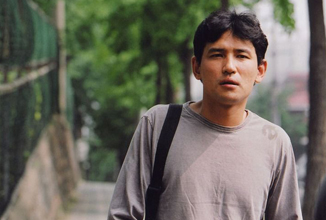 |
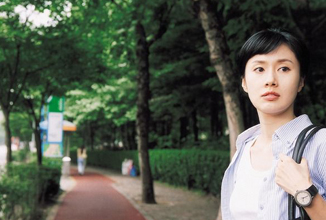 |
Jeong-hae's past is depicted in a series of flashbacks and these are beautifully (and deliberately) understated - often with no explanation as to who is shown or where the scene fits into the overall picture - but each is so exquisitely crafted that no explanation is ever necessary. Case in point: Jeong-hae finds an old book which has been used to set one of her plants on and, as the book is badly soiled, she orders a replacement at the local book store. When the new copy is delivered, she briefly flicks through the pages and we are shown the memories it brings to her mind in a small flashback scene. Lasting only seconds (and with no dialogue), it is nonetheless perfectly clear not only who the person in the scene is, but also the relationship of that character to Jeong-hae, as well as a complete picture of what subsequently happened to them. Different flashbacks appear throughout the length of the film (some relatively subdued, others utterly frenetic), with the movement between them and present day events so natural that each feels like a journey through Jeong-hae's mind. Together these "memories" add up to a complete, and comprehensive, back-story which allows Jeong-hae's present situation to take on a much greater emotional resonance than would otherwise have been possible and to elicit viewer empathy to an astounding degree.
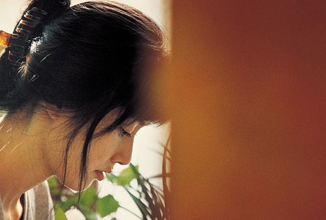 |
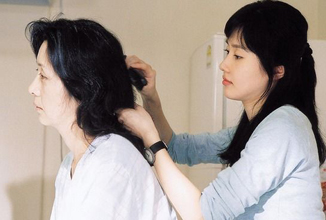 |
I realise that I have been deliberately vague with regard to proceedings in This Charming Girl but, since almost everything that occurs also has a much larger part to play later in the film, I feel that is necessary.
Rest assured that no matter how mundane Jeong-hae's life appears on the surface, viewers will find it almost impossible not to become utterly immersed in the quietly gripping story of a lady who has far greater depth than any of those around her realise.
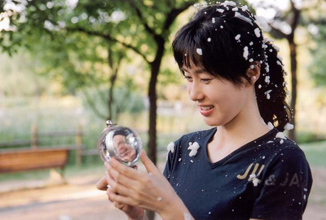 |
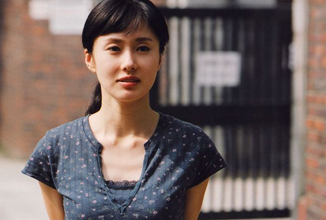 |
Cinematically, This Charming Girl (the original Korean title translating as A woman, Jeong-hae) lies somewhere between art film and fly-on-the-wall documentary, but is stronger than either, thanks to director Lee Yoon-ki's ability to make the hand-held camera work intimate, almost to the point of intrusion, while never allowing the camera to be conspicuous. The result is akin to actually being in the scene, a voyeur on the edge of proceedings, with the unfolding drama feeling palpably real. In fact, the only time during the whole of This Charming Girl that I was consciously aware of sitting, watching a film, was in a scene featuring a drunken young man in a restaurant, and the subsequent motel scene. That's not to say that either of those segments is necessarily less accomplished (and both are required for a specific plot twist), but more that the rest of the film is so astoundingly well made that they stand out as (ever so slightly) weaker by comparison. The aforementioned hand-held camera work used throughout the film is never overdone and will really only be noticeable to those specifically looking for it, but its underlying effect results in a huge boost to the realism present.
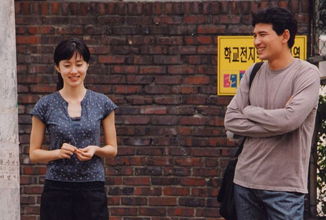 |
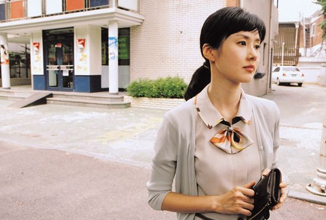 |
Cast:
This Charming Girl really is Kim Ji-soo's film. She appears in every scene (aside from a couple of small flashbacks) and her performance is exquisite. With the camera often being so close as to actually show the pores on her skin, she never allows it to appear that she is aware of its presence, and that in itself helps the audience to forget that it's there. Her acting is incredible throughout and, in a role where her facial expressions are almost as important as her dialogue, she never fails to make the character of Jeong-hae utterly real. I truly felt for Jeong-hae as the film progressed and a large part of that is thanks to Kim Ji-soo's pitch-perfect performance.
No discussion of her portrayal of Jeong-hae would be complete, however, without mention of a bathroom scene which consists only of Jeong-hae looking at herself in the mirror and crying. The scene is longer than any other scene of its type that this reviewer has ever seen, but Kim Ji-soo effortlessly holds the audience utterly transfixed throughout and makes every bittersweet second unmissable.
The remaining roles are very much supporting parts and all concerned give great performances - including Hwang Jung-min, as the object of Jeong-hae's affection, and Kim Kkobbi, as Jeong-hae in her youth.
Summary:
This Charming Girl peels away the layers of an ordinary, everyday woman to reveal a character much more interesting and complex than she appears on the surface. An incredible film with astounding realism, This Charming Girl deftly shows that everyone has a story worth telling.
DVD
The DVD
edition reviewed here is the Korean (Region 3) Bear Entertainment Release
which consists of a single disc DVD with deluxe packaging and an accompanying booklet. The film itself is
provided as an anamorphic transfer with an aspect ratio of 1.85:1. There are no image artifacts and no ghosting present, and the
picture remains consistently sharp with colours which accentuate the realism present in the film. The original Korean
language soundtrack is provided as a choice of Dolby Digital 5.1 and Dolby Digital 2.0 and each is clear and expansive, giving full justice to the beautifully sparse soundtrack. Excellent subtitles are provided
throughout the main feature.
DVD Extras:
"Making of" featurette
"This Charming Girl - Their Story"
"This Charming Girl - Continuity"
The audition
Music poster
Footage from the premiere
Behind-the-scenes photo sessions for the film poster
Trailers
DVD
Details:
This Charming Girl
Director: Lee Yoon-ki
Release Date: 18th July 2009
Language: Korean
Subtitles: English, Korean
Country of Origin: South Korea
Picture Format: NTSC
Aspect Ratio: 1.85:1
Sound: Dolby 5.1, Dolby 2.0
Disc Format(s): Single Disc DVD
Region Code: 3
Duration: 100 (mins)
Publisher: Spectrum DVD
|
All images © Bear Entertainment, LJ Films, The Korean Film Council and Spectrum DVD
Review © P. Quinn
|
| |
LKFF2018 Review #1:
 |
"When I was a kid, I always sat alone in the playground after the other boys had gone and, thinking about my late mother,
it struck me that we'd all disappear in the end..."
Jung-won runs the Chowon photo studio, taking photographs of families and developing prints for local businesses. He loves his simple life, but is seriously ill and has made the conscious decision to keep his condition secret from all but his family. However, when a beautiful young traffic warden, Da-rim, begins to frequent his studio, he finds himself quickly falling for her and, as they start to become closer, he is forced to make an agonisingly difficult choice - either tell her how ill he really is, or step away from the relationship altogether...
From the outset of Christmas in August, it is clear that though Jung-won is dealing as best he can with his (unnamed) illness, and is determined to carry on living the simple life which he loves, he is less able to cope with the resultant pain that the knowledge of the extent of his malady causes those close to him, but while his decision to tell no-one outside his immediate family of his condition is a conscious and (in one respect, at least) admirable attempt to keep others from being hurt, that decision also directly causes a separate set of pains and heartaches, most specifically to Da-rim, and Jung-won himself:
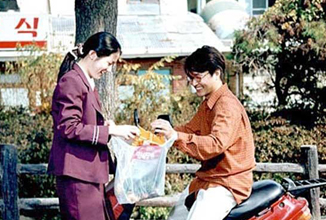 |
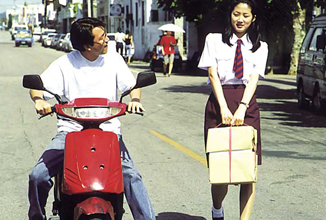 |
Jung-won knows that a future with Da-rim is impossible, no matter how much he wants to be with her, and the heartbreaking choice of either telling her the full extent of his situation and illness, or quietly backing away from the blossoming relationship without explanation, increasingly weighs on his mind more than his illness itself.
Da-rim, being utterly unaware that Jung-won is unwell, repeatedly battles to understand why he seems so reticent to allow her to get closer to him, and his lack of explanation, far from saving her from pain, leaves her believing that she is simply being rejected. From her point of view, his seemingly uncaring attitude only serves to make her feelings of hurt cut even more deeply and, in fact, by far the most poignant scenes in Christmas in August all centre around the hurt caused to the two main characters by this lack of explanation, and the resultant confusion of feelings and misunderstandings.
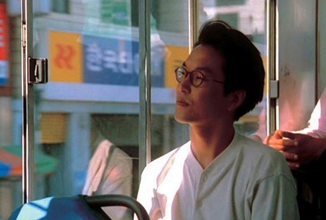 |
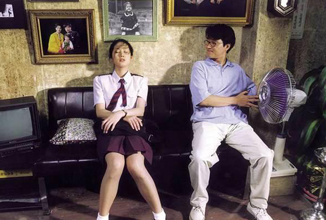 |
The age-old idiom "A picture paints a thousand words" really sums up the state of play in Christmas in August.
Here we have a heartfelt, poignant and affecting story of love and loss, where characters, more often than not, use words to deliberately gloss over, or distract attention from, what they really feel. The dialogue is gentle, witty and perfectly understated throughout, but it is its combination with the tiniest changes in character facial expressions which tells viewers everything, while (vocally) very little is outwardly stated regarding the feelings hidden beneath the words.
"I love you" is never uttered in Christmas in August, but the phrase repeatedly screams out of every pore of the faces of both Da-rim and Jung-won, and it is blatantly clear, almost from the first moment that the two characters meet, that they are soul mates who quite simply belong together, despite what fate has in store for them.
Similarly, no specific vocal discussion of Jung-won's illness is undertaken, to any real degree, in the film - on the couple of rare occasions where an attempt is made by a character to bring up the subject, Jung-won either denies that there is anything wrong, or makes a joke out of telling the truth, thereby, once again, deflecting attention from the grim reality of the situation - and while it is the single biggest plot device present in the film, it is rarely the focus of direct attention. Though Jung-won is never fully free from thoughts of his condition, the pain we are routinely shown is more often that of those close to him, and his hurt at knowing that he is the cause of their anguish.
While a plethora of films with similar storylines exist in South Korean cinema, Christmas in August is much less gushingly sentimental (and less melodramatic) in its plot delivery than most, allowing the film to be far more genuinely, and believably, moving as a direct result.
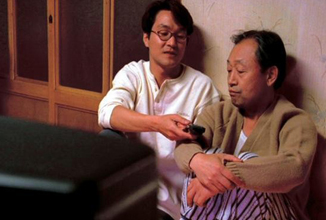 |
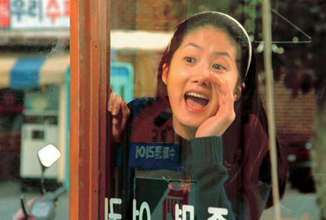 |
Cinematically, like many of Hur Jin-ho's films, Christmas in August is visually intimate while never coming across as intrusive. With the majority of scenes being, outwardly, fairly simple, perfect camera angles and character positioning serve to almost always place our would-be lovers together in frame (as their relationship begins to blossom), thereby adding to the feeling that these two characters truly are meant to be together.
As the story progresses, this intimate framing gradually gives way to a deliberate visual separation of the characters which becomes all the more noticeable, and heartbreaking, when combined with Da-rim's confusion and hurt, increasing in tandem with the extent of Jung-won's illness.
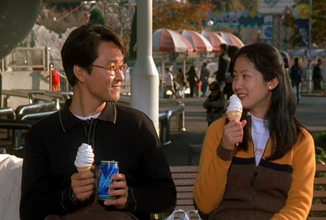 |
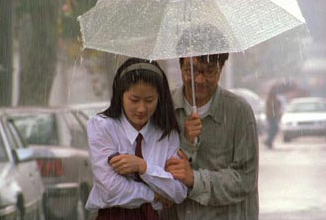 |
Cast:
Han Suk-kyu gives a polished and accomplished performance as Jung-won. Early on in proceedings, his character's repeated smiles and happy demeanor appear to be a little overplayed, but it quickly becomes obvious that that apparent overplaying is, in fact, Jung-won's attempts to hide the extent of his illness from those around him, and that Han Suk-kyu has deliberately placed the slight "fakeness" into his portrayal of the character. As the poignancy of the storyline builds, his performance becomes all the more nuanced and perfectly understated, resulting in an utterly memorable character depiction.
Shim Eun-ha's portrayal of Da-rim is exquisite, feeling absolutely real from start to finish. Her performance in Christmas in August played a large part in cementing her place as one of the most popular actresses in South Korea, and watching the multitude of feelings which she is able to effortlessly convey with a tiny gesture or facial expression, it is easy to see why.
Shim Eun-ha stopped acting when she got married in 2001 (to become a successful artist) but, to this day, many still wait patiently in the hope that she will return to acting at some point in the future.
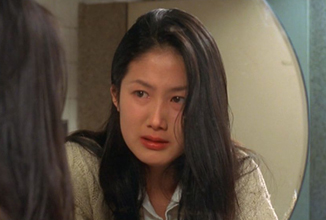 |
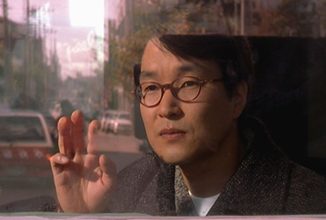 |
Summary:
One of Hur Jin-ho's most accessible films, Christmas in August is a heartfelt, poignant and affecting story of love and loss, in which the words "I love you" never need to be said.
Cast
Han Suk-kyu
Shim Eun-ha
Goo Shin
Oh Ji-hye
Lee Han-wi
DVD
The DVD edition reviewed here is the UK (Region 0) Tai Seng Entertainment single disc edition. The film itself is provided as an anamorphic transfer with an aspect ratio of 1.85:1 and there are no image artifacts (and no ghosting) present.
The original Korean language soundtrack is provided as Stereo 2.0 and is crisp and clear, if unremarkable.
The musical score is well balanced and reasonably nuanced, complimenting the visuals beautifully throughout.
Excellent subtitles are provided for both the main feature and all of the extras.
DVD Details:
• Director: Hur Jin-ho
• Format: PAL, Anamorphic, Widescreen, Subtitled
• Language: Korean
• Subtitles: English/Chinese
• Sound: Korean Stereo 2.0, Cantonese 5.1 Dolby Digital Surround Sound, Cantonese Stereo 2.0
• Region: Region 0
• Aspect Ratio: 1.85:1
• Number of discs: 1
• Classification: 12
• Distributor: Tai Seng Entertainment
• Run Time: 110 minutes (approx.)
DVD Extras:
• Director's Audio Commentary
• 'Making of' Featurette
• Music Video
• Trailers
|
All images © Tai Seng Entertainment
Review © P. Quinn
|
| |
|


